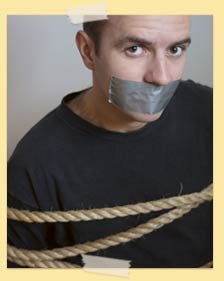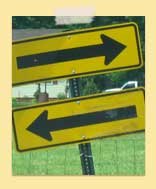Survivor Narrative
Michael
Fifty years ago when I was beginning my struggle to come to terms with my homosexuality there were no Christian ex-gay programs, at least none that I was aware of. Nor was there any gay rights movement, and books treating the subject were few and hard to find. Christian churches were unanimous in condemning homosexuality as a sin. The psychiatric profession listed it as a severe but curable mental illness, while the legal establishment defined it as a crime. Society grouped homosexuals together with child molesters, rapists, voyeurs, and exhibitionists into a catch-all category called variously sex perverts, sexual deviates, or simply sex fiends. All were widely and equally feared and despised.
 Inevitably I absorbed and internalized many of these homophobic attitudes, coming to believe that I was seriously mentally ill. Predictably the effect on my self-esteem was highly negative. While I was able to maintain some degree of self-respect, my self-confidence suffered. Queers were not known for their competence and ability.
Inevitably I absorbed and internalized many of these homophobic attitudes, coming to believe that I was seriously mentally ill. Predictably the effect on my self-esteem was highly negative. While I was able to maintain some degree of self-respect, my self-confidence suffered. Queers were not known for their competence and ability.
After graduating from college with an advanced degree I tried for a time to find and enter the gay demimonde, but my internalized homophobia caused me to feel guilty and somehow "dirty" whenever I ventured into the gay scene. In addition, my employment required that I hold a security clearance, and I had to be extremely careful not to compromise my cleared status. (In those days homosexuals were automatically assumed to be security risks because of the very real potential for blackmail.) This made any kind of gay social life difficult and risky for me. For a few months during this period I saw a psychiatrist, but found the experience unhelpful and the cost burdensome. By this time I was more than 30 years old and feeling quite lonely and in need of a companion to share my life.
It was against this background that I resolved to "cure" myself of my homosexuality. After all, wasn't homosexuality a curable mental illness? Methodically I embarked on a campaign of self-transformation. I bought a house, a boat, new clothes, and a new car. I had myself fitted with contact lenses and had my hair styled. I registered with a computer dating service and joined the local bachelors' club. I took ballroom dance lessons and plunged headlong into the dating game. I also attempted to banish all gay fantasies from my mind.
During this time I remained skeptical that I could ever become "straight" because my homosexuality felt like such an integral part of my personality. But I reasoned that I could never be certain that change was impossible until I had made a good-faith effort.
After a few months of indiscriminate dating, I met a young woman whose company I enjoyed and with whom I felt comfortable, and we were married. (Ironically, six months later the Stonewall rebellion would occur.) My thinking at this time was that if only I could manage to live a straight life I would, perforce, become straight. I resolved to be faithful to my wife as long as we were married and to eschew any form of double life for myself.
 The marriage lasted twenty years and produced two sons. But, even though I kept my resolutions and lived a perfectly straight and faithful married life, my experiment in self-transformation was not only a dismal failure but a disaster as well. At no time during my marriage did I feel heterosexual or even bisexual. Marital relations, always emotionally painful, became burdensome as well. I felt like a circus bear trained to perform an act alien to its nature such as roller skating or riding a bicycle. I began to resented being "put through my paces." Very gradually, and to the considerable distress of my wife, I lost all interest in sex. I felt that, rather than living my own life, I was living the life of a fictional "straight" character of my own creation. I feared that I would live out my entire life never having interacted honestly with another human being. I became severely depressed.
The marriage lasted twenty years and produced two sons. But, even though I kept my resolutions and lived a perfectly straight and faithful married life, my experiment in self-transformation was not only a dismal failure but a disaster as well. At no time during my marriage did I feel heterosexual or even bisexual. Marital relations, always emotionally painful, became burdensome as well. I felt like a circus bear trained to perform an act alien to its nature such as roller skating or riding a bicycle. I began to resented being "put through my paces." Very gradually, and to the considerable distress of my wife, I lost all interest in sex. I felt that, rather than living my own life, I was living the life of a fictional "straight" character of my own creation. I feared that I would live out my entire life never having interacted honestly with another human being. I became severely depressed.
It was during one of my deeper depressions that I came out to my wife. At the time we had been married for seventeen years. She was understandably devastated, but, for an additional three years she attempted to find some way to reconcile herself to the situation. Unable to do so, she finally asked for a divorce.
 Following the divorce I found myself in an untenable position. At age 53 what was I to do with the balance of my life? Should I repeat my earlier mistake and marry another hapless woman? Never. Should I continue to masquerade as a heterosexual but live alone and celibate? Not an appealing thought. Or, should I come out of the closet at last, be myself for once, and let the chips fall where they may? A terrifying thought to be sure. What would happen? Would I lose my job? Would my sons and my two brothers disown me? Would all my friends desert me? If all these things should happen, who could I turn to for support? After twenty years of living a strictly straight life, I knew no gay person nor did I have any idea how to go about contacting one.
Following the divorce I found myself in an untenable position. At age 53 what was I to do with the balance of my life? Should I repeat my earlier mistake and marry another hapless woman? Never. Should I continue to masquerade as a heterosexual but live alone and celibate? Not an appealing thought. Or, should I come out of the closet at last, be myself for once, and let the chips fall where they may? A terrifying thought to be sure. What would happen? Would I lose my job? Would my sons and my two brothers disown me? Would all my friends desert me? If all these things should happen, who could I turn to for support? After twenty years of living a strictly straight life, I knew no gay person nor did I have any idea how to go about contacting one.
While pondering these options, I received notice of the annual convention of Parents, Family and Friends of Lesbians and Gays (P-FLAG) soon to be held in a nearby city. On impulse I registered and attended. Seeing all those wonderful GLBT young people and the relationships they enjoyed with their accepting and supportive parents gave me the impetus I needed. On the plane returning me from the convention I resolved to come out as soon as I arrived back home.
The first hurdle was the highest. I summoned the older of my two sons and came out to him. Being something of a computer nerd, he immediately proceeded to inform me of all the online resources available to gay people. From that moment onward it was all downhill. The following day I came out to my supervisor at work and to the company security officer. At church the following Sunday I came out to the entire congregation en mass. Yes, it was scary, and, in retrospect, I guess I went a little bit crazy. I felt like a parachutist jumping from a burning aircraft with an old parachute of highly dubious reliability. But, at the same time, it felt wonderful to finally stand before the world as myself rather than hiding behind a mask that totally misrepresented me.
I was 55 when I discarded the mask. In the years since I have met and befriended many wonderful GLBT people. I was a charter member of an organization for GLBT professionals. I led my church in a program to help it become more welcoming to its GLBT members. I have led a gay-straight organization within my church. I have twice attended church retreats organized by and for gay men. I have danced with a GLBT square-dance club. I have recruited gay and lesbian speakers to address local college nursing classes. I have attended local P-FLAG meetings and marched in gay pride parades, including two marches on Washington. I have found these activities extremely rewarding. They have made me feel that I am taking meaningful action to benefit myself and others while simultaneously representing my true self.
But, alas, all is not unalloyed joy. At this writing I live alone and expect to remain so even though I would welcome companionship. My libido remains "out of ardor", and, at my age, I don't expect a revival. I remain celibate. Although I hold my former wife entirely guiltless in the matter, I nevertheless have come to view my failed marriage as twenty years of self-inflicted sexual abuse. I remain bitter toward a benighted society whose procrustean forces drove me to a life of self-denial, deceit, and deprivation.
To my surprise few of the negative consequences of coming out that I initially feared have actually materialized. One of my brothers initially reacted negatively, but he has since renewed his friendship. Before coming out I never felt I had a true friend because I could never be sure of their acceptance if they should come to know the "real me." Now I know very well who my real friends are, and I have many. I have also learned that it is not necessary that I be universally loved; a small circle of supportive friends is quite enough.
Read other ex-gay survivor narratives.
